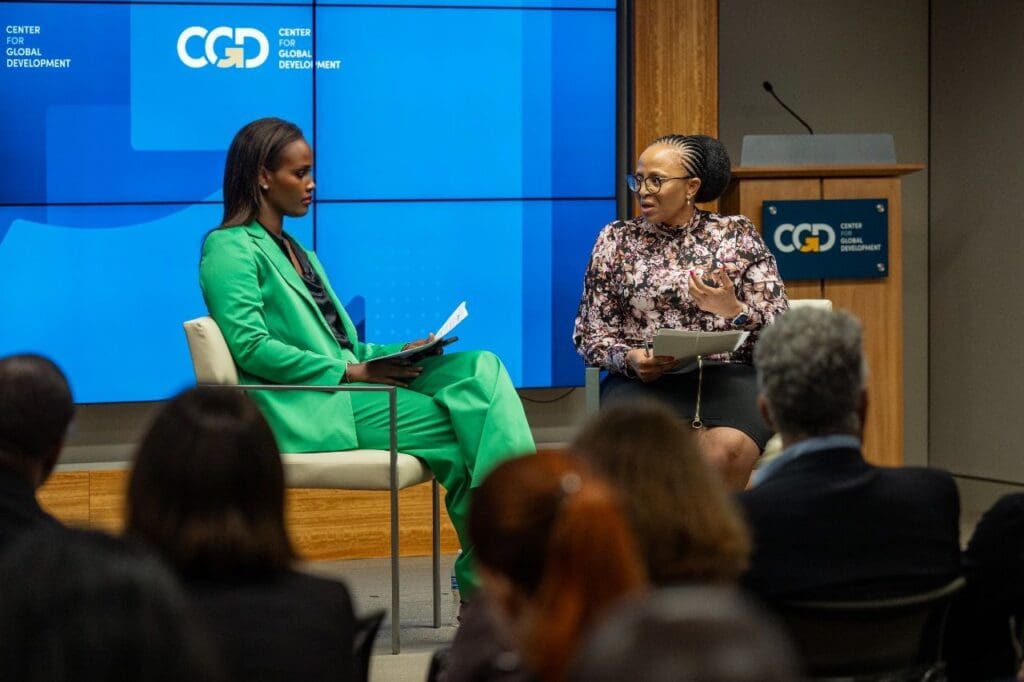Blog
Global Experts Call for Increased IDA Support Amid multiple global shocks at High-Level Event Hosted by Center for Global Development and AfriCatalyst
In a week marked by strong appeals for increased support to the International Development Association (IDA), experts have praised IDA’s efforts in supporting Africa’s key priorities while emphasizing the need for greater concessionality and expanded funding to address critical needs in the continent’s most vulnerable regions during an event hosted by the Center for Global Development and AfriCatalyst titled “IDA and the Global Safety Net” on the sidelines of the World Bank and International Monetary Fund Annual Meetings. The discussion focused on IDA’s response to the ongoing global polycrisis and its new approach to results management.
In his opening remarks, Jean-Claude Tchatchouang, Senior Advisor at AfriCatalyst, underscored IDA’s notable contributions in tackling Africa’s pressing challenges, including infrastructure development, human capacity building, and climate resilience. However, he raised questions about whether IDA is fully equipped to respond effectively to today’s complex crises. “We need to reduce Africa’s reliance on foreign currency-denominated debt, which exposes many countries to significant risks, such as exchange rate volatility,” Tchatchouang emphasized.
The event began with a fireside chat featuring Dr. Retselisitsoe Matlanyane, Minister of Finance of Lesotho, who reflected on IDA’s critical role in meeting the financing needs of African countries as they navigate overlapping crises, including the COVID-19 aftermath, the war in Ukraine, and tightening global financial conditions.”
“IDA’s significance for developing and least developed countries cannot be overstated. It has played a crucial role in addressing Africa’s priority areas, especially in the social sectors. IDA remains instrumental in securing access to global public goods, which are key to strengthening global peace, stability, and improving livelihoods,” said Dr. Matlanyane.
She also praised IDA’s responsiveness during times of crisis, including the COVID-19 pandemic, geopolitical tensions, and climate change after effects. “Waning fiscal space and rising debt levels have forced many African nations to turn to IDA’s financing to relieve some of these pressures,” she added.
However, Matlanyane also called for reforms in the IDA framework to ensure easier access to resources, especially during crises. “It’s not enough to simply disburse funds without ensuring sustainable impact. There’s room for improvement in how we use these resources and in the overall size of the funding envelope, particularly as we face unprecedented global challenges,” she said.

Following the fireside chat, the first panel discussion, “Is IDA Equipped for Our Time of Crisis?”, moderated by Clemence Landers, Senior Fellow at CGD, featured prominent speakers, including Ishac Diwan, Research Director at Finance for Development Lab, Gargee Ghosh, President of Global Policy & Advocacy at the Bill & Melinda Gates Foundation, Margaret Kuhlow, Deputy Assistant Secretary for International Development Finance and Policy at the U.S. Department of Treasury, and Dirk Reinermann, Director of IDA Resource Mobilization and IBRD Corporate Finance at the World Bank.
The panel explored IDA’s role in maintaining macroeconomic stability in low-income countries, particularly its engagement on issues like debt and climate change. One of the key takeaways was the need for a balance between concessionality and funding volumes.
“Concessionality is crucial, but so is volume. As challenges evolve, IDA must balance both to remain effective. There are three key levers: donor contributions, balance sheet optimization, and financial terms. Each lever plays a part in maximizing impact while managing risks,” Dirk Reinermann said.
The second panel, Is IDA’s New Results Measurement System Fit for Purpose?, moderated by Karen Mathiasen, Project Director at the Center for Global Development, featured Paloma Anos Casero, Director of Strategy at the World Bank; Kate Donald, Head of Office, Washington, DC at Oxfam International; and Julie Trepanier, Director General of International Finance and Development at the Finance Ministry of Canada. This discussion focused on IDA’s newly overhauled results measurement system, examining its impact on accountability and progress, particularly in gender equality.
Julie Trepanier emphasized the need for a clear narrative that ties IDA’s results to concrete outcomes
“We need to tell a clear and compelling story about how these changes fit into the bigger picture. Progress is happening, but it requires a collective effort from all stakeholders,” she noted.
Kate Donald raised concerns about alignment between IDA’s broad goals and the specific outcomes outlined in the new framework
“While the inclusion of inequality as a new indicator in the corporate scorecard is a positive step, there seems to be a mismatch between ambition and specificity. Closing this gap is critical to achieving the goals,” said Donald.
